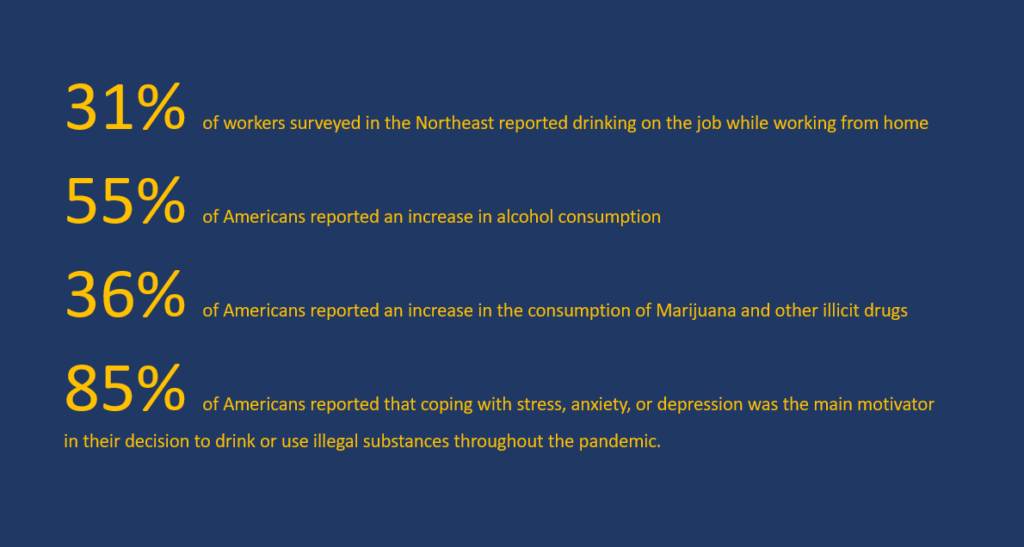It is a sad reality that often, people turn to drug and alcohol use to cope with tough times. The recent pandemic put many working Americans under a lot of stress. Some people may have lost a loved one or a job, taken a pay cut, etc. A study from The Recovery Village shows that drug and alcohol use has increased during the pandemic, and frequently this is a result of coping with the mentally taxing environment the coronavirus has presented.
Drug and alcohol consumption in the workplace presents companies with significant liability. Impairment can lead to the mistreatment of customers, other employees, improper handling of sensitive information and materials, and overall damage to the company name. Being able to detect troublesome behavior in employees and colleagues is vital to preventing these problems. More importantly though, drug and alcohol assessments are vital to ensure their well-being. So, what can companies do to protect their employees from these struggles and limit company liability?

1. Know The Purpose of Your Policy
The first thing any company should ask themselves before implementing a drug policy is, “Why do we need it”? For example, if a firm is in the transportation industry, having an employee under the influence operating a vehicle puts not only their own lives, but others’ at risk. Similarly, if your company is federally-funded, it is required that your firm has a drug policy and employee training procedure in place to maintain its status.
There are a number of reasons to have a sound drug assessment policy in place. Normally though, there is an action a firm is trying to prevent against or a standard they are trying to achieve that underscores their policy. For transportation companies, it would be preventing driving while impaired. For federally-funded companies, it would be adhering to government mandates to maintain their funding. Ultimately, every substance assessment policy in the workplace should be goal-driven.
2. Your Workforce Dictates Your Policy
Now that you have a goal your policy aims to accomplish, how do you accomplish it? Unfortunately, there is no cookie-cutter way to implement a workplace substance assessment policy. A company’s policy largely relies on the makeup of its workforce. The composition of a firm’s workforce can vary greatly depending on size, location, and industry, and therefore policy will vary as well. Take the following into consideration when you begin implementing a policy:
- What will your company test for?
- Is there already an evident issue around one substance in the workplace?
- Does your workforce have a history of using a certain substance abusively?
- Is Marijuana legal in your state? If so, what special procedures are required to test for it?
- How frequently will your company test?
- Are there laws that put a limit on the number of times you can test?
- Does something require your company to test a minimum number of times?
- Does the frequency vary for people that fail in the past vs. pass? If so, how?
It can often be helpful to hire a third party organization to help collect data on your workforce in order to determine the best policy for your firm.
3. How Will You Test?
There are plenty of things that will make implementing a testing strategy complex. The main dilemma surrounds ensuring employee privacy, while still maintaining test effectiveness and accuracy. When it comes to improving the accuracy of tests, there are two main things to do.
- Research testing methods for the substance your firm will be testing for. Which is more accurate generally? How long ago can that method detect a substance from?
- Make sure samples are from the person you are testing.
When it comes to respecting privacy, keep in mind the purpose of the test is not to catch them in the act. It is to prevent a problem from arising in the first place. Respecting employee privacy boils down to one thing: transparency. When establishing a new substance policy, a firm should clearly communicate the following with their employees:
- When they will be tested – give them notice well in advance.
- What criteria may give the company grounds to test on short notice (ie. another employee reporting substance-fueled misbehavior).
- The method of testing.
- Consequences of a failed test and next steps.
Ignoring employee privacy is not only irresponsible of a company, but can lead to legal troubles as well.
4. Build It to Last
Just like your employees are the lifeblood of your company’s product or services, they are also that for your substance assessment policy. Employees should be well trained about the consequences of substance abuse and how to detect and deal with a perceived problem in the workplace. Educating your workforce can help reinforce and prolong a substance-free workplace.
5. Be Able to Help Your Employees
Substance abuse is an issue far deeper than the impact it has on a company, and caring for individuals suffering from it is the priority of any drug assessment program your company implements.Nobody wants to see something bad happen to a coworker and friend. It is vital that employees in your firm struggling with substance abuse have access to the help they need to recover.
